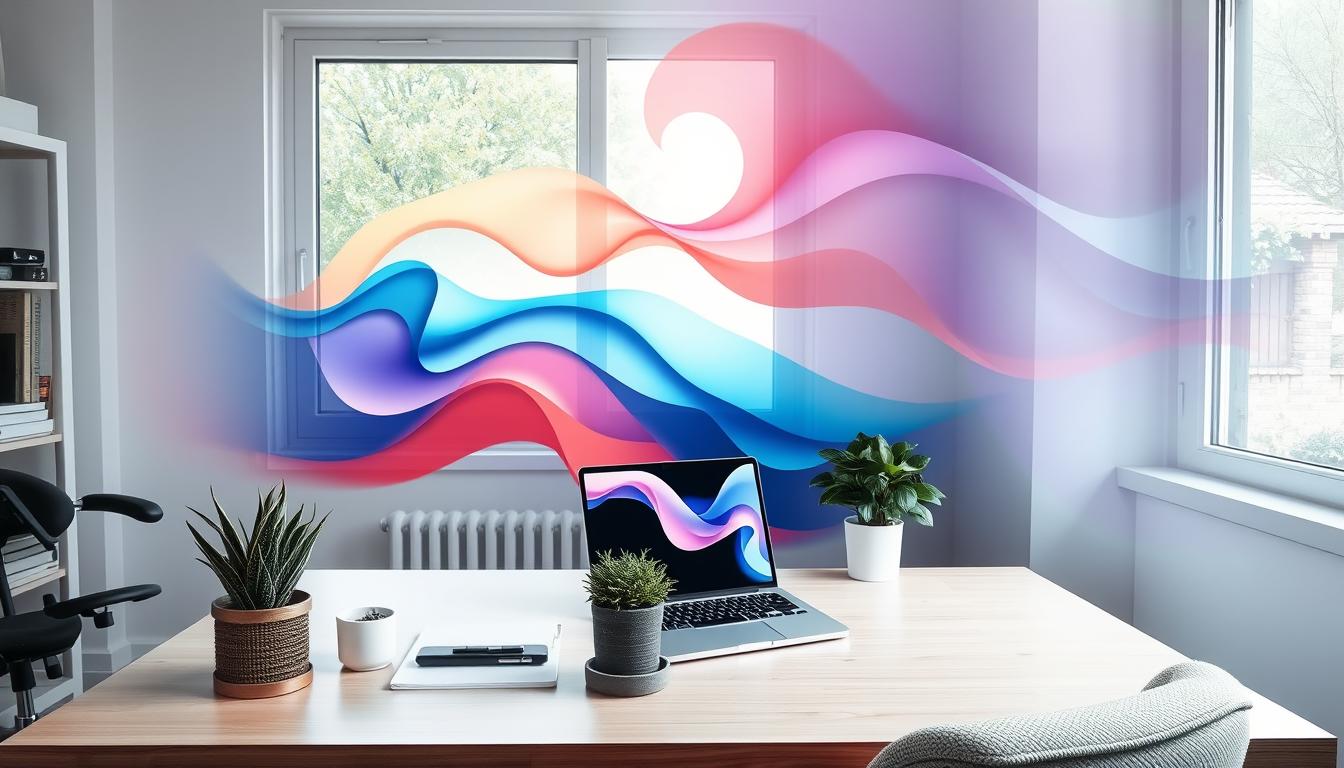Last Updated on December 9, 2025
Many believe multitasking boosts efficiency and time management, fitting well in today’s fast world. Yet, research shows multitasking can actually decrease productivity. Our brains struggle to handle multiple tasks at once. Instead, we switch between tasks, slowing down our thinking and increasing mistakes. This piece explores the neuroscience of multitasking, showing how it reduces productivity and effectiveness in our daily lives.
Understanding multitasking’s impact on our minds and emotions is crucial. Trying to handle many tasks at once can exhaust our mental energy. It can also shorten our attention span and raise stress levels. By acknowledging multitasking’s drawbacks, we can seek better ways to manage tasks. This leads to a more efficient workflow, boosting our productivity.
Key Takeaways
- Multitasking slows cognitive processes and increases errors.
- Chronic multitaskers often have reduced attention spans.
- Effective management of tasks can boost productivity and reduce stress.
- Implementing single-tasking strategies enhances cognitive function.
- Regular breaks improve focus and productivity levels.
Understanding Multitasking
Multitasking is often seen as a productivity booster, but research paints a different picture. Engaging in multitasking techniques can actually decrease efficiency. Only 2.5% of participants in studies could handle multiple tasks without losing quality.
Switching between tasks requires your brain to recalibrate, wasting precious minutes. This recalibration affects your time management, leading to delays in goal achievement. Multitasking also disrupts your short-term memory, making it hard to hold onto important information.
Studies indicate a 40% drop in productivity with frequent multitasking. People vary in their ability to manage multiple tasks, especially in fast-paced settings like contact centers. Those who excel in multitasking often see better job performance, including increased sales.
Employers gain from hiring employees who can handle multiple tasks efficiently. This leads to a smoother efficient workflow, less stress, and higher productivity. Focusing on one task at a time can improve task completion and performance metrics.
The Human Brain is Not Designed for Multitasking
The human brain faces a significant challenge when trying to multitask. Engaging in multiple tasks at once often results in decreased performance and an increase in errors. Neuroscientists have found that switching between tasks incurs switching costs, leading to cognitive fatigue and delays in starting tasks. Our brains struggle with managing various tasks, as they heavily rely on executive functions for prioritization.

Virtual meetings often tempt people to multitask. It’s common for attendees to split their focus between tasks like responding to emails or unrelated work. This divided attention reduces engagement, leading to longer discussions, less effective decision-making, and more meetings to reach conclusions.
Research shows office workers may take up to 25 minutes to recover from interruptions and refocus on their original tasks. A study on Microsoft employees found widespread multitasking during remote meetings, due to insufficient time caused by excessive scheduling. Chronic multitaskers often find it hard to manage working memory, leading to distractions and poorer performance in cognitive tasks.
The belief in effective multitasking can impair metacognition, making it hard to accurately assess performance. Surprisingly, individuals in studies scored significantly lower when required to switch tasks every four minutes compared to those who could work consecutively. To combat multitasking in meetings, strategies like keeping meetings short, establishing agendas, and making attendance optional for non-urgent tasks can boost productivity.
Concentrating on a single task has been shown to save time, improve accuracy, and reduce stress. Acknowledging the limitations of our cognitive functions can lead to better productivity tools and methods, helping us move away from the multitasking myth.
How Multitasking Affects Attention Span
Multitasking is often seen as a way to boost productivity, but it can actually harm your focus. Our brains are designed to handle one task at a time. Constantly switching between tasks disrupts our concentration and control. This not only causes distractions but also lowers our efficiency.
Research reveals that multitasking can affect the brain like sleep deprivation or drug use, potentially reducing IQ by ten points per switch. It takes an average of twenty-three minutes to refocus after an interruption. This results in significant time lost due to *multitasking productivity*.

American youth spend 7.5 hours daily on media, with 29% of that time spent multitasking. This cultural trend has led to a decrease in attention span. It has dropped from 2.5 minutes in 2004 to just 47 seconds today.
Constant interruptions lead to increased stress and fatigue, causing more errors and longer task times. Focusing on one task improves memory retention. Taking regular breaks helps the brain recover, enhancing cognitive resources and productivity.
Multitasking Productivity: The Reality Check
Many believe that handling multiple tasks at once boosts their productivity. However, research paints a different picture. A whopping 100% of clients engage in multitasking, yet it often results in lower overall effectiveness.
Studies show that multitasking doesn’t just slow you down; it can cost up to 40% of your productive time. Eighty percent of workers feel exhausted due to frequent multitasking. It’s crucial to adopt effective task management strategies to counter this trend.

The F.L.O.W. Model can transform time management. It involves working for 50 minutes, then taking a 10-minute break. This approach lowers stress and boosts productivity. It not only improves multitasking but also streamlines workflow management.
Effective task management, like using to-do lists and prioritization, has proven successful for many. Implementing these tools at the end of each day prepares you for the next. It leads to a more productive work environment. Recognize the drawbacks of multitasking and focus on strategies that enhance focused efforts to reach your goals.
Illusions of Productivity: Task Switching Explained
Task switching often seems to boost productivity. You might feel productive juggling many tasks, but research shows a harsh truth. Switching tasks can cut productivity by up to 40%. This drop happens because your mental resources are split. You can’t fully focus on one task, leading to lower efficiency and quality.
Studies show that switching tasks adds a small time cost. But frequent switching leads to a huge productivity loss. Heavy multitaskers find it hard to separate important info from distractions. A 2009 Stanford University study found that stopping multitasking helps switch tasks more smoothly, showing the importance of task management.
Experts suggest doing no more than two tasks at once to boost output. Multitasking increases errors, stress, and the chance of missing important details. Simple steps like reducing distractions can help you stay focused on your tasks.
- Create a To-Do list with 3-5 critical tasks daily.
- Consider implementing a “Not Gonna Do List” to streamline decisions.
- Turn off notifications to prevent interruptions from emails and messages.
By adopting these strategies, you can use your willpower and self-regulation better. Reducing distractions and focusing on key tasks improves productivity. This way, you avoid the negative effects of task switching.

Impact of Multitasking on Cognitive Function
Engaging in multitasking significantly affects your cognitive function and overall productivity. When you attempt to juggle multiple tasks, the brain’s efficiency diminishes, leading to cognitive overload. Research illustrates that this overload may hinder not only efficiency but also your ability to perform tasks accurately.
Decreased Brain Efficiency
When you divide your attention across various activities, your brain struggles to maintain the same level of focus. Studies have shown that multitasking reduces efficiency, as cognitive resources are spread thin. This scattered attention can make it difficult to process information properly, resulting in a decline in your overall cognitive performance.
Higher Error Rates in Task Completion
Multitasking frequently results in increased error rates. When you juggle multiple objectives, the likelihood of making mistakes escalates. Research has demonstrated that individuals engaged in multitasking tend to overlook critical details. As a result, the quality of work may suffer, impacting both productivity and effectiveness in task management.
Stress, Well-Being, and Multitasking
Engaging in multitasking often increases stress, negatively impacting your well-being. Chronic stress, affecting 35% of people, significantly harms health. This stress comes from handling multiple tasks, causing cognitive overload and anxiety.
Trying to do many things at once hampers the brain’s task management. A Stanford University study found that heavy multitaskers struggle to focus and remember information. This strain makes them feel overwhelmed, with research showing a 47% increase in perceived stress from multitasking.

Perfectionism adds to stress, as individuals feel the need to excel in every task. About 52% of people show a cortisol stress response due to perfectionism. This shows multitasking’s link to stress and the need for effective management strategies. Using methods like prioritization can help manage tasks better and maintain control.
To create a healthier work environment, delegate tasks that are not urgent. This boosts productivity and fosters teamwork. Using effective time management techniques, like setting realistic goals, can also help alleviate multitasking stress.
Keeping your mental health and well-being in check is crucial. Regular physical activity boosts endorphins, fighting stress naturally. Recognizing multitasking’s negative effects on well-being can inspire better strategies for a healthier, more productive life.
Alternatives to Multitasking
Stepping away from multitasking reveals more effective productivity strategies. Focusing on one task at a time boosts your ability to deliver quality work. This approach not only streamlines time management but also increases task satisfaction.
Single-tasking as a Productive Strategy
Embracing single-tasking can greatly enhance productivity. Psychologist David Meyer notes that task switching can lead to a 40% productivity drop after just one switch. A focused approach optimizes cognitive resource allocation. Short interruptions can nearly double error rates, highlighting the importance of singular focus.
By dedicating yourself to one task, you reduce decision fatigue. This allows you to enter a flow state, where productivity peaks.

The Benefits of Task Prioritization
Task prioritization offers numerous advantages. It enables you to address urgent tasks first, improving focus and reducing confusion. Categorizing tasks enhances time management skills. Setting specific times for activities like email checks or phone calls minimizes distractions.
This structured method also fosters a better work/life balance. It simplifies managing your responsibilities.
For more on productivity and task management, check out this resource.
Tips for Effective Task Management to Boost Productivity
Effective task management strategies can greatly boost your productivity. Techniques like batching and time blocking can optimize your workflow. These methods help you focus on what’s important by reducing distractions. Mindfulness in your daily routines is key to maintaining attention and boosting efficiency.
Batching and Time Blocking Techniques
Batching involves grouping similar tasks together. This reduces the need for constant task switching, which can be inefficient. The American Psychological Association notes that multitasking actually decreases productivity. Time blocking allows you to dedicate specific times to each task, ensuring full focus.
Productivity tools, like calendar apps, help set reminders for these blocks. This ensures each task gets the attention it deserves, streamlining your process.
Cultivating Mindfulness in Daily Routines
Mindfulness is crucial for improving task management skills. Being aware of your multitasking habits helps you focus better. Simple habits, like short breaks or a clean workspace, can reduce stress and enhance decision-making.
Planning your day for just ten minutes can save up to two hours. Adopting these practices can transform your daily routines and significantly boost your productivity.
Conclusion
The science behind multitasking reveals a surprising truth. What appears to be efficiency is often a mere illusion. Mental shifts needed for task switching consume extra time, greatly reducing productivity. This can increase stress and lower cognitive abilities, making it harder to focus on critical tasks.
Adopting single-tasking and prioritizing your work can significantly improve your performance and mental health. By dedicating focused time blocks to specific tasks, you refine your work approach. This leads to better work quality and success rates.
Improved focus, combined with strategic task management, creates an optimal work environment. By prioritizing tasks and reducing distractions, you pave the way for greater achievements and satisfaction. Changing your view on multitasking can transform your professional life, enhancing both productivity and fulfillment.








